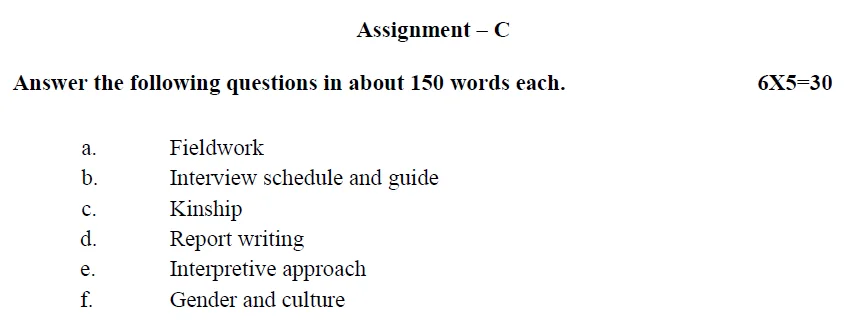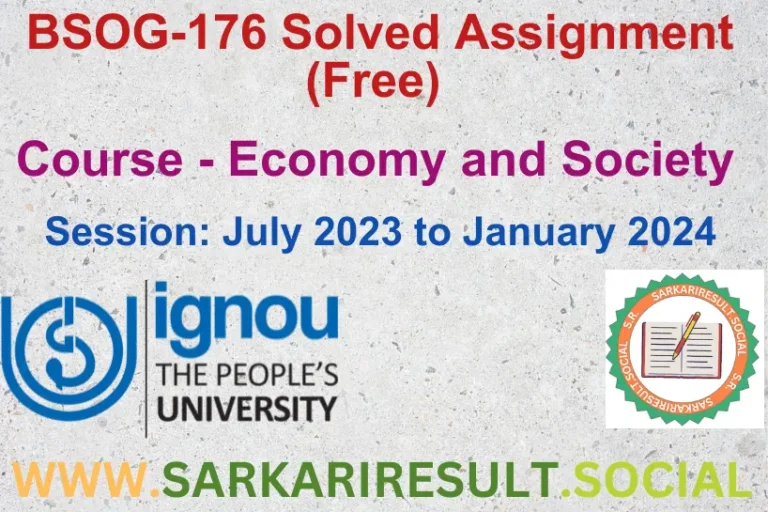BANC-133 IGNOU Solved Assignment 2023-24 (free) Part 3

BANC-133 IGNOU Solved Assignment 2023-24 (free) Part 3
“Unlock the world of Social and Cultural Anthropology with these BANC-133 IGNOU Solved Assignment 2023-24 (free) Part 3. In Assignment – C, you’ll find concise answers to six questions, each requiring responses of approximately 150 words. These solved responses will guide you towards success in your IGNOU solved assignments for 2023-24.”

a. Fieldwork
Ans. Fieldwork is a fundamental research method employed in social sciences and anthropology. It involves immersive, firsthand investigation within the natural context of study. Researchers conduct observations, interviews, and participant interactions to collect data. Fieldwork offers rich insights into diverse cultures, societies, and phenomena. It enables researchers to understand behaviors, traditions, and social dynamics, bridging the gap between theory and real-world experiences. This method demands adaptability, cultural sensitivity, and extended periods of engagement, contributing to comprehensive and nuanced research outcomes. Fieldwork is pivotal for uncovering hidden facets of human life and culture.
BANC-133 IGNOU Solved Assignment 2023-24 (free) Part 1
b. Interview schedule and guide
Ans. An interview schedule and guide are essential tools for conducting structured interviews in research. The schedule outlines the sequence of questions, topics, and instructions to ensure consistency. It typically includes an introduction, main questions, and a conclusion. The guide provides the interviewer with prompts, probes, and expected responses, ensuring uniformity and reliability. Both help maintain a focused and organized interview process, allowing researchers to gather relevant data effectively. Researchers should pilot test the schedule and guide to refine them before data collection. These tools enhance the validity and reliability of the research findings by minimizing interviewer bias and ensuring a systematic approach.
BANC-133 IGNOU Solved Assignment 2023-24 (free) Part 2
c. Kinship
Ans. Kinship is a foundational social structure governing familial relationships. It defines the bonds and connections between individuals based on blood ties, marriage, or adoption. Kinship systems vary across cultures, influencing roles, responsibilities, and inheritance patterns. Understanding kinship is crucial for comprehending social organization, as it impacts societal norms, family dynamics, and inheritance rights. Anthropologists employ kinship studies to explore how different societies conceptualize and organize family units, revealing insights into cultural values and societal structures. Kinship forms the basis of familial and social networks, playing a vital role in the transmission of traditions and values across generations.
BANC-131 Solved Assignment 2023-24 (free) Part 1
d. Report Writing
Ans. Report writing is a concise, structured method of presenting information, typically for conveying research findings, analysis, or factual details to a specific audience. It follows a formal format with sections such as an introduction, methodology, results, and conclusion. Reports aim to provide clear, objective, and organized information, often with recommendations for action. They are essential in various fields, including business, academia, and government, for decision-making and communication. Effective report writing demands clarity, accuracy, and adherence to a prescribed format, ensuring that readers can easily understand and act upon the presented information.
BANC-131 Solved Assignment 2023-24 (free) Part 2
e. Interpretive approach
Ans. The interpretive approach is a research perspective that emphasizes understanding human behavior and phenomena by interpreting the meanings people attribute to them. Rooted in social sciences like sociology and anthropology, this approach rejects strict positivist methods and instead explores the subjective and context-dependent nature of human experiences. Researchers employing the interpretive approach often use qualitative methods, such as in-depth interviews and ethnographic observations, to uncover the rich layers of meaning behind actions, beliefs, and symbols. It is particularly valuable in studying complex social and cultural phenomena, as it delves into the perspectives and interpretations of individuals and groups to gain deeper insights.
BANC-131 Solved Assignment 2023-24 (free) Part 3
f. Gender and Culture
Ans. Gender and culture are intertwined aspects of human society. Culture shapes and defines the roles, expectations, and behaviors associated with gender. It influences how societies perceive masculinity and femininity, impacting gender norms, stereotypes, and opportunities. Conversely, gender plays a significant role in cultural identity and expression, influencing everything from clothing and language to family structures and rituals. The relationship between gender and culture varies across societies and time periods, reflecting the diversity of human experiences. Understanding this dynamic is crucial for addressing gender inequalities and promoting cultural sensitivity, as it highlights how social constructs intersect with cultural values and traditions.
BANC-132 Solved Assignment 2023-24 (free) Part 1







